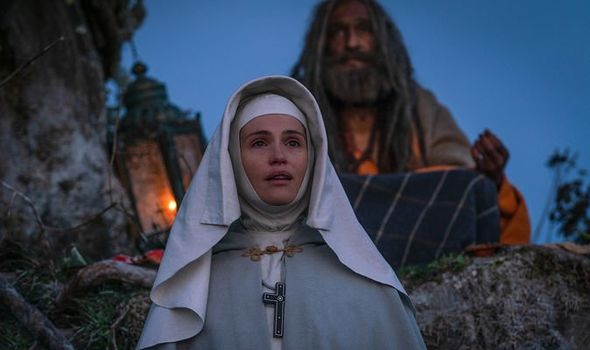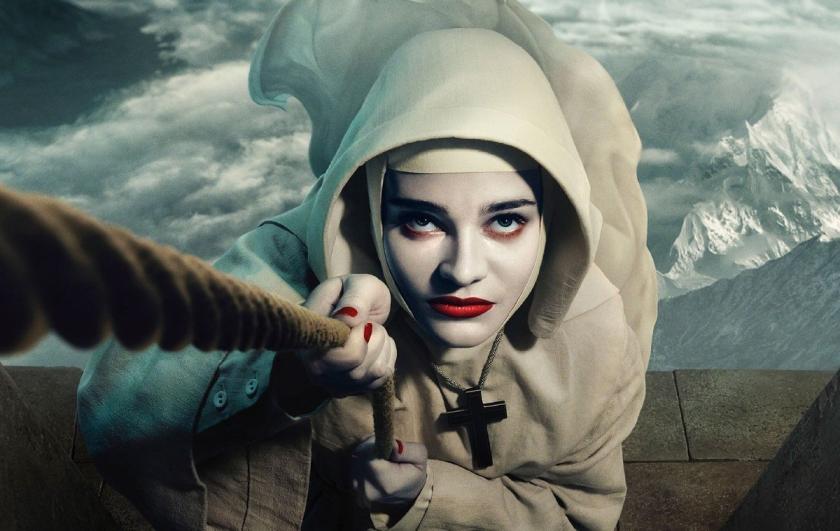It’s dangerous territory, remaking a classic British film as a TV mini-series. In 1947 when Michael Powell and Emeric Pressburger created Black Narcissus, a heady adaptation of Rumer Godden’s 1939 novel, they never set foot in the Himalayas. But somehow, out of glass painted backdrops, cinematographer Jack Cardiff evoked the vertiginous, intoxicating landscape that overwhelms an order of nuns sent to do God’s work among the natives.
Cardiff won an Oscar for his dazzling Technicolor work on the sound stages of Pinewood; those are quite some footsteps for Danish cinematographer Charlotte Bruus Christensen to follow. But she’s done a beautiful job, harnessing a superb palate of light and colour, in-camera effects, aerial location shots and digital manipulation, particularly in the grading of her images.
Doubling as the director, Christensen is helped by an impressive performance by Gemma Arterton (pictured below) as Sister Clodagh, the Sister Superior who has to keep order in her troupe of missionary nuns. Diana Rigg, in her last-ever role, plays the Mother Superior who despatches the nuns from Darjeeling to the wilds of Mopu. Their calling is to bring education to the local children and teach needlework skills to the young women villagers.
But their new convent is an abandoned palace high in the Himalayas, built by the local potentate to house his harem. In order to make the haunted palace fit for its Christian purpose, erotic murals must be veiled and the locals drafted into help. In the original film, this entailed smothering Jean Simmons in blackface to play the nubile temptress Kanchi, but we’ve moved on and Nepali newcomer Dipika Kunwar is very convincing in the role. The veteran Nila Aalia plays Angu Ailia, who knows the dark secrets of the harem's past and doubts the nuns' capacity to withstand the ghosts that haunt the palace.
 The casting of Aisling Franciosi as the jealous Sister Ruth, who challenges Sister Clodagh's authority from the outset, is more problematic. Although Franciosi is a good actress, she's no match for Kathleen Byron’s indelible performance in the original film. Excellent in The Fall, Franciosi seems too young to be a proper rival for Sister Clodagh; she's a child in need of protection rather than the nun's peer. Her white faced, red-rimmed eyes pay homage to the make-up Byron wore in the pivotal scene from the 1947 film (main picture) but it only heightens Franciosi’s youth.
The casting of Aisling Franciosi as the jealous Sister Ruth, who challenges Sister Clodagh's authority from the outset, is more problematic. Although Franciosi is a good actress, she's no match for Kathleen Byron’s indelible performance in the original film. Excellent in The Fall, Franciosi seems too young to be a proper rival for Sister Clodagh; she's a child in need of protection rather than the nun's peer. Her white faced, red-rimmed eyes pay homage to the make-up Byron wore in the pivotal scene from the 1947 film (main picture) but it only heightens Franciosi’s youth.
Similarly, Alessandro Nivola’s performance as the louche Mr Dean, the general’s agent, is far from subtle. He is libidinous right from the start and there’s only so much manly smouldering a clutch of nuns can take. Sister Clodagh bristles and tells him: ‘"You mustn’t speak to me in this familiar way,” signalling too early the love triangle that will make the drama develop. Deborah Kerr as the original Sister Clodagh didn't suffer from carnal dreams of her past love which haunt Arterton repeatedly; the erotic tension is more explicit than in the 1947 film, and it's not always to the TV series' advantage.
The adaptation by Amanda Coe mines more of Rumer Godden’s novel, which was concerned with dilemmas of faith in an alien land. Godden apparently hated the original film and it would be interesting to know what she would have made of this version. There’s a plethora of foreshadowing and flashbacks which help stretch out the screen time and allow for Christensen to show her cinematographic range. The film came out shortly after India achieved its independence from Britain and was seen as an example of how the Empire had lost its ability to put its stamp on the world. The nuns retreat from a foreign world they cannot control. Politics is avoided in this adaptation, instead three nights of wallowing in luscious scenery, repressed passion and white wimples await us.















Add comment